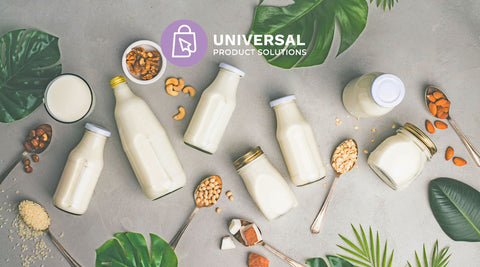Plant-based milks are an easy and versatile way to bring new flavours and textures into your meals. You might be making a breakfast smoothie, stirring up a creamy curry, or simply adding a splash to your tea — there’s a dairy-free option that fits right in.
Why Choose Plant-Based Milk?
• Naturally lactose-free and suitable for vegan diets
• Lower in saturated fat than many dairy options
• Fortified with calcium and vitamins for added nutrition
• Environmentally friendly alternative to traditional dairy
Each plant milk has its own unique flavour and texture, which means some are better suited to certain recipes or routines. Let’s take a closer look at the most common types:
Different Types of Plant Milk and When to Use Them
• Rice Milk
Naturally sweet and light, rice milk has a subtle flavour and a very smooth, watery texture. It’s a great option for people with allergies to soy or nuts. Because of its mild taste, rice milk blends easily into cereals, smoothies, and iced drinks without overpowering other ingredients. It’s also naturally sweeter than other plant milks, so it’s ideal if you prefer a hint of sweetness.
Want to try rice milk? We like Joya Rice Drink for its sweet, light taste and smooth texture — great in smoothies or a splash in your tea.
• Soy Milk
Soy milk is one of the most versatile and widely used plant-based milks. It’s naturally creamy with a slightly nutty taste and has a higher protein content than most dairy-free options. That makes it a solid substitute in cooking and baking — from sauces and custards to cakes and muffins. It also froths well, so it’s a favourite in coffee and tea.
Need a soy-based cooking cream? Natumi CreSoy Cuisine is your go-to — it adds a smooth, creamy texture to your favourite recipes.
• Oat Milk
Thicker and naturally a little sweet, oat milk has become especially popular thanks to its smooth texture and neutral taste. It’s brilliant in lattes, cappuccinos, and other hot drinks, as it steams well and adds a rich creaminess. It’s also a great choice for baking, porridge, and smoothies if you want something hearty without being heavy.
Thinking of trying oat milk? We recommend The Original Oatly Barista Edition — it’s perfect for coffee lovers, froths beautifully, and adds that perfect creamy texture to your drinks.
• Almond Milk
With its light texture and mild nutty flavour, almond milk is a go-to for many. It’s a flexible choice that works well in both sweet and savoury dishes — from overnight oats and smoothies to soups and pasta sauces. It’s lower in calories than some other options, making it a popular pick for those looking for a lighter milk alternative.
• Coconut Milk
Coconut milk offers a rich, creamy texture with a distinct coconut flavour, making it perfect for adding tropical flair to your recipes. It’s ideal for curries, soups, and smoothies, as well as in baking where a creamy, slightly sweet base is needed. While higher in fat than many other plant-based milks, its thick consistency makes it a top choice for dessert recipes. It can also be used in coffee and hot drinks for a luxurious, velvety texture.
Adding plant-based milk to your routine doesn’t have to be complicated, and we’ve got a few tried-and-tested options to help. Explore our selection to find your perfect dairy-free match.





